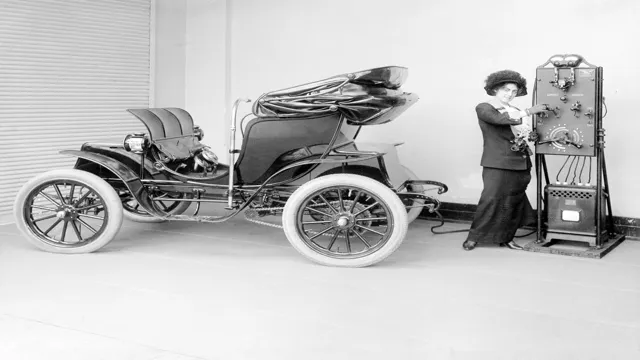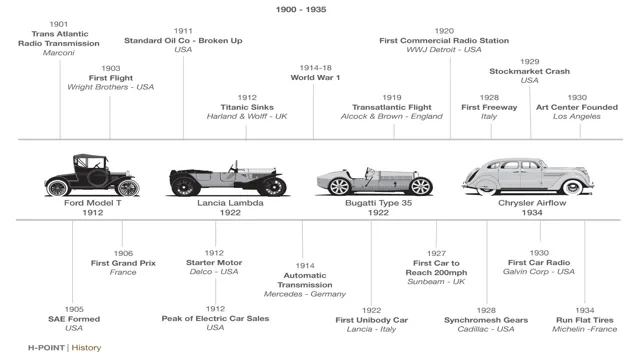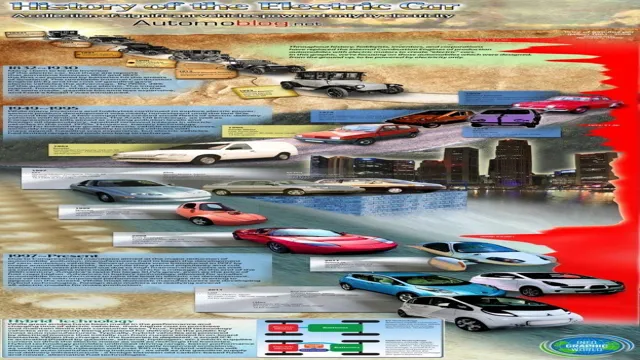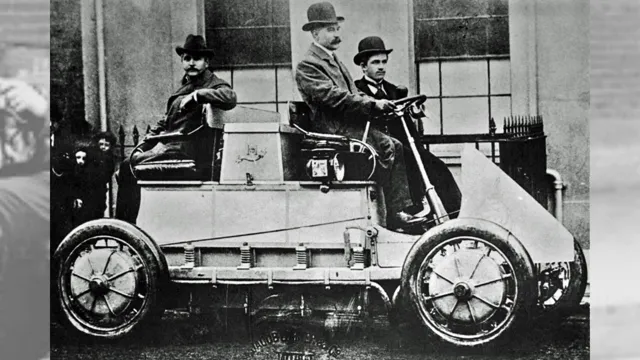From Rarities to Revolution: A Fascinating Electric Car History Timeline
Electric cars have always been an innovative and fascinating mode of transportation. While modern electric cars have gained almost universal acceptance, they have a long and fascinating history that dates back to the 19th century. Focused on efficiency and clean energy, electric cars have been touted as the future of the automotive industry.
However, it’s important to understand the past to truly appreciate the present. In this blog, we’ll delve into the history of electric cars and present an in-depth timeline of their evolution from their humble beginnings to their current position as the most sought-after vehicles on the market. So if you’re curious about how electric cars got their start, keep reading to find out!
Early Innovations
The history of electric cars dates back to the early 1800s, when innovators began experimenting with battery-powered vehicles. One of the first pioneers was Scottish inventor Robert Anderson, who created the first crude electric carriage in 183 However, it wasn’t until the late 1800s that electric cars began to gain significant attention.
William Morrison developed the first successful electric car in the United States in 1891, which could travel up to 14 miles per hour and had a range of around 50 miles per charge. The inventions of Thomas Parker and Ferdinand Porsche in the early 1900s also helped spur the development of electric cars. Despite these early innovations, gasoline-powered cars dominated the market due to their longer range and lower cost.
However, the electric car history timeline shows that advancements in battery technology and environmental concerns have brought electric cars back into the spotlight, as manufacturers strive to create practical and cost-effective electric vehicles for the modern era.
1828: Ányos Jedlik invents a small-scale electric car.
Electric Car The advent of electric cars can be traced back to the early years of the 19th century. In 1828, the Hungarian physicist and engineer Ányos Jedlik invented a small-scale electric car. This early innovation in electric vehicle technology used a rudimentary electric motor, a few batteries, and a simple chassis made of wood.
Despite being an early prototype, the invention of the electric car was a significant milestone in the history of transportation. It demonstrated the feasibility of using electricity as a power source for automobiles, paving the way for future advancements. Although Jedlik’s invention was not commercially viable at the time, it laid the foundation for the development of electric cars over the next century.
Today, electric cars have become a popular alternative to traditional gasoline-powered vehicles as they offer a cleaner, more efficient, and sustainable mode of transportation.

1835: Thomas Davenport builds the first American DC electric motor.
The year was 1835, and Thomas Davenport had just accomplished something truly remarkable: building the first American DC electric motor. This was a huge advancement in the realm of technology and sparked a wave of innovation in the early 19th century. It paved the way for the development of newer and more efficient electric motors that would eventually power countless machines and devices in the industrial revolution.
Davenport’s invention was revolutionary, but it wasn’t until much later that people realized just how transformative it would be. Today, the world runs on electric power, and it all started with Davenport’s pioneering work. The DC electric motor, as we know it today, is the result of years of innovation and evolution, built on the foundation laid by Davenport’s invention.
Thanks to early innovators like him, we are able to enjoy all the modern conveniences of electric power and continue to make progress towards an even brighter future.
1859: French physicist Gaston Planté invents the lead-acid battery.
In 1859, Gaston Planté, a French physicist, invented the lead-acid battery, which is considered one of the earliest innovations in battery technology. This battery type was the first to utilize reversible chemical reactions, which allowed it to be recharged. It quickly became popular due to its low cost and high reliability, making it a popular choice for automobiles and other forms of transportation.
Today, we can see the influence of Planté’s invention in modern-day vehicles, which depend on lead-acid batteries for their ignition and lighting systems. Although newer technologies have emerged that use alternative materials, the lead-acid battery still has an important place in energy storage, particularly for applications that require large amounts of power output, such as emergency generators and electric forklifts. Gaston Planté’s invention paved the way for many of the modern technologies that we use today, reminding us that every innovation begins with a single step.
The Rise of Electric Cars
The history of electric cars dates back to the early 19th century when inventors like Thomas Davenport, Robert Anderson, and Thomas Parker began experimenting with electric-powered vehicles. However, it wasn’t until the late 1800s that practical advancements in electric car technology began to emerge. The first commercially successful electric car was developed by William Morrison in 1891 and boasted a range of up to 50 miles on a single charge.
In the early 20th century, electric cars became popular choices for urban transportation due to their quiet and clean operation. However, the development of gasoline-powered cars soon overshadowed electric cars, and they fell out of favor until the 1970s when concerns over air pollution and oil shortages sparked renewed interest in electric vehicles. Since then, advances in battery technology, charging infrastructure, and efficiency have led to the rise of electric cars as viable competitors to traditional gas-powered cars.
With countries committing to phasing out gasoline cars and automakers heavily investing in electric vehicle development, the future of the automotive industry looks to be electric.
1884: Thomas Parker builds the first practical electric car in London.
Electric Cars The mid to late 19th century saw a number of experiments with electric cars, but it wasn’t until Thomas Parker’s breakthrough in 1884 that a practical design was developed. Parker built the first electric car in London, utilizing rechargeable batteries and an electric motor to power the vehicle. Electric cars quickly gained popularity with city dwellers who were drawn to the quiet, clean, and efficient nature of the vehicles.
In fact, by the turn of the 20th century, electric cars accounted for around one-third of all automobiles on the road. However, the development of the internal combustion engine and the discovery of vast reserves of oil led to a decline in electric car production. It wasn’t until the late 20th century that electric cars again began to gain traction as environmental concerns and advances in battery technology reignited interest in this alternative mode of transportation.
Today, electric cars continue to grow in popularity as more and more people see the benefits of driving a vehicle that doesn’t rely on fossil fuels.
1908: Henry Ford introduces the Model T, making gasoline cars highly affordable.
With the introduction of the highly affordable Model T by Henry Ford in 1908, gasoline cars quickly became the norm. As a result, electric cars, which were initially introduced in the early 1900s, started to take a backseat. However, in recent times, electric cars have seen a resurgence in demand and popularity.
A key factor driving this change is the high awareness of the environmental impact caused by gasoline cars. People are looking for more sustainable alternatives that won’t harm the environment. Additionally, advancements in electric car technology have made these vehicles a viable option for everyday use.
With improved battery life and charging capabilities, electric cars have comparable range and performance to their gasoline counterparts. Furthermore, government incentives and the expansion of charging infrastructure have made owning an electric car more convenient and cost-effective. It’s clear that the tide is turning towards electric cars, and it won’t be long before they become the norm on highways around the world.
1912: Charles Kettering invents the first electric car starter.
The rise of electric cars began with the invention of the electric car starter by Charles Kettering in 191 This invention solved one of the biggest problems with early automobiles – the need for a hand crank to start them. With the electric starter, drivers could simply press a button or turn a key to start their car, making driving much more accessible and convenient.
While electric cars were not yet mainstream at this time, Kettering’s invention played a crucial role in paving the way for their development in the coming decades. Today, electric cars are gaining popularity as more people become aware of their benefits, including low emissions and improved fuel efficiency. As we look to the future of transportation, electric cars are likely to play an increasingly important role in reducing the carbon footprint of the automotive industry.
1930-1960: Despite advancements in electric car technology, gasoline cars remain dominant.
Despite advancements in electric car technology during the 1930s to 1960s era, gasoline vehicles continued to dominate the market. Even though electric cars had a considerable advantage due to their quietness and zero emissions, oil companies heavily promoted gasoline cars, making them look more convenient and affordable to the masses. This was a significant setback for the electric car industry, causing a drop in demand and manufacturing.
However, it is essential to note that early electric cars had a significant drawback when it came to range. Electric cars had a limited distance they could cover on a single charge, while gasoline cars had a longer range and offered the convenience of refueling almost anywhere. Despite this, electric cars continued to evolve, and with the introduction of more affordable lithium-ion batteries and advancements in electric motor technology, they have become more practical for daily use.
Today, electric cars are fast becoming a popular option as people become more aware of their carbon footprint and the need to reduce air pollution.
Electric Cars Today
If we look back into the history of electric cars, the first prototype was developed in the 1830s, but it wasn’t until the late 1990s that electric cars started gaining popularity. In 1996, General Motors produced the EV1, a vehicle that could travel up to 140 miles on a single charge. However, the EV1 was not available for sale, and GM later scrapped the project, much to the disappointment of electric car enthusiasts.
It wasn’t until the early 2000s that electric cars started making a comeback, with the Toyota Prius and Tesla Roadster gaining popularity. In recent years, electric cars have become more accessible and affordable, with companies like Nissan, Chevrolet, and Tesla introducing models with longer ranges and faster charging times. Today, electric cars are seen as a practical and eco-friendly alternative to traditional gasoline-powered vehicles.
With the increasing demand for sustainable transportation, it’s no surprise that the electric car market is expected to continue growing in the coming years.
1990: General Motors creates the first modern electric car, the EV1.
Electric cars have come a long way since the creation of the first modern electric vehicle by General Motors in 1990. The EV1, as it was called, was a game-changer, introducing the concept of zero-emission cars to the world. Fast forward three decades to today, and electric cars have become increasingly popular, and for good reason.
The advancements in battery technology and charging infrastructure have made it more convenient to own and use electric vehicles, almost to the point where they can be seen as a more practical choice than gas-powered cars for some drivers. Not only do electric cars offer environmental benefits, such as significantly lower carbon emissions, but they also offer excellent performance with instant torque, quiet driving, and low maintenance costs compared to their gas-powered counterparts. Moreover, the cost of owning an electric car has come down considerably, making them more accessible to the general public.
As urban areas ramp up efforts to phase out gas-powered cars, we can expect electric vehicles to continue to grow in popularity in the years to come.
2008: Tesla Motors releases the Roadster, the first electric car capable of 200 miles on a charge.
Electric Cars Today Electric cars have come a long way since their inception. With the release of the Tesla Roadster in 2008, electric cars became more efficient and capable of traveling longer distances on a single charge. The Roadster was the first electric car to achieve a range of 200 miles, which was a significant milestone at the time.
Since then, electric cars have continued to evolve, with advancements in battery technology and charging infrastructure. Today, electric cars are more popular than ever, with more and more people choosing to go electric. They offer several advantages over traditional gas-powered cars, including lower emissions, lower operating costs, and a quieter and smoother driving experience.
While there are still some challenges to overcome, such as charging infrastructure and range anxiety, electric cars are a rapidly growing segment of the automotive industry. With continued innovation and investment, it’s likely that electric cars will become even more common and accessible in the coming years. So if you’re looking for a cleaner, more efficient, and more enjoyable driving experience, electric cars are definitely worth considering.
2010: The Nissan Leaf becomes the first mass-produced all-electric car.
Electric cars have come a long way since the first attempts at creating a battery-powered vehicle in the 1800s. In recent years, there has been a renewed interest in electric cars, thanks to advancements in technology and concerns about the environment. In 2010, the Nissan Leaf made history by becoming the first mass-produced all-electric car.
It was a groundbreaking moment that signaled a shift in the automobile industry. Since then, other automakers have followed suit by introducing their own electric cars. Today, electric cars are becoming more and more popular as people seek greener alternatives to traditional gasoline-powered cars.
They offer a cleaner, more sustainable way of transportation that is better for the environment and more cost-effective in the long run. With advancements in technology and growing demand, it’s clear that electric cars are the way of the future and are here to stay.
The Future of Electric Cars
The history of electric cars dates back to the early 19th century when inventors started experimenting with battery-powered vehicles. The first electric car was created in the late 1800s, and by the early 1900s, electric vehicles were becoming more popular than gasoline vehicles. However, advancements in gasoline-powered vehicles made them more efficient and practical, and electric cars fell out of favor.
In the 1970s, due to concerns about oil prices and environmental issues, electric cars saw a resurgence in popularity. Unfortunately, the technology was not yet advanced enough to make electric vehicles a viable option for most people. However, with the rapid advancements in battery technology in recent years, electric cars are more efficient and practical than ever before.
Today, the electric car is rapidly gaining market share as more and more people recognize the benefits of electric vehicles over gasoline-powered cars. As we move towards a greener future, the electric car will undoubtedly play an increasingly critical role, and we can expect to see even more advancements in the years to come.
2020: Most major car manufacturers are investing heavily in electric car technology.
Electric Cars The times are changing, and so are our vehicles. Most major car manufacturers are making significant investments in electric car technology, and the future of cars is looking electric. This is not just a trend, but a necessary shift towards a sustainable future.
Electric cars are becoming more popular by the day and for good reason. They emit less pollution, use less energy, and are a lot quieter than conventional cars. The technology has improved drastically in recent years, and modern electric cars can go hundreds of miles before needing a recharge.
In addition, they are far cheaper to operate, and as the technology continues to improve, the initial purchase price is dropping drastically. Imagine never having to stop at a gas station again! So, the future of cars is definitely electric, not just for us but for generations to come.
2030: Experts predict that electric cars will dominate the market.
Electric cars have been around for some time, but the future looks bright for them as experts predict that they will dominate the market by 2030. This shift towards electric cars can be attributed to various reasons, including advancements in technology and growing concerns about the environment. With electric cars, there is no need to worry about harmful emissions that contribute to air pollution, and they can be powered by clean energy sources like solar or wind power.
Additionally, some governments are offering incentives to encourage people to switch to electric cars, making them more accessible and affordable. As more people adopt this eco-friendly technology, we can expect to see significant improvements in air quality and reduced greenhouse gas emissions. It’s clear that electric cars are the way of the future.
Conclusion
In conclusion, the history of electric cars is a testament to the power of human ingenuity and innovation. From their modest beginnings in the early 1800s to the futuristic electric vehicles of today, electric cars have come a long way. While they were initially overshadowed by their gas-guzzling counterparts, electric cars are now making a comeback thanks to their eco-friendliness, efficiency and affordability.
As we continue to develop new technologies and explore alternative energy sources, the future of electric cars is looking brighter than ever. Who knows? One day, we may even reach a point where gasoline-powered cars are nothing more than relics of the past, as we all drive sleek electric vehicles that zip around silently and effortlessly. The journey may have been long and winding, but the destination is definitely worth it – and, as they say, the best is yet to come!”
FAQs
When was the first electric car invented?
The first electric car was invented in 1837 by Robert Anderson.
What was the first mass-produced electric car?
The first mass-produced electric car was the Columbia Electric Phaeton in 1897.
When did electric cars become more popular than gasoline cars?
In the early 1900s, electric cars were more popular than gasoline cars, but this trend reversed due to advancements in gasoline engine technology and the discovery of cheap and abundant oil sources.
When did the modern electric car revolution begin?
The modern electric car revolution began in the mid-2000s with the release of the Tesla Roadster and the Nissan Leaf, which marked a significant improvement in range and affordability for electric cars.
What is the current state of the electric car market?
The electric car market has continued to grow in recent years, with increased offerings from major automakers and improved infrastructure for charging. However, electric cars still account for a relatively small percentage of overall vehicle sales.





